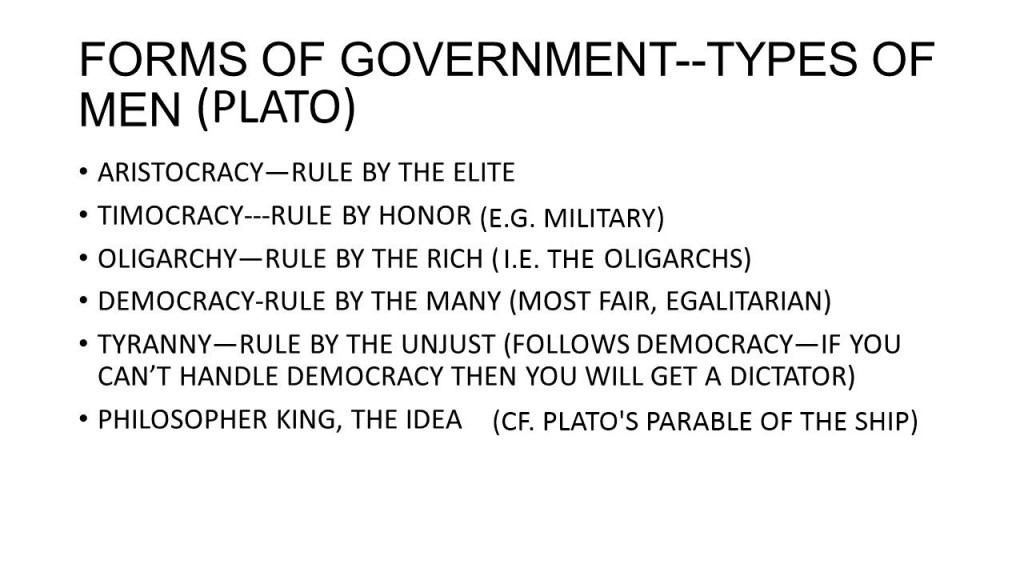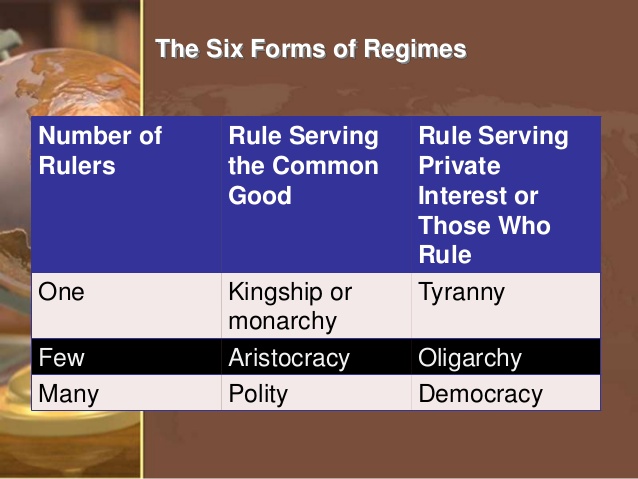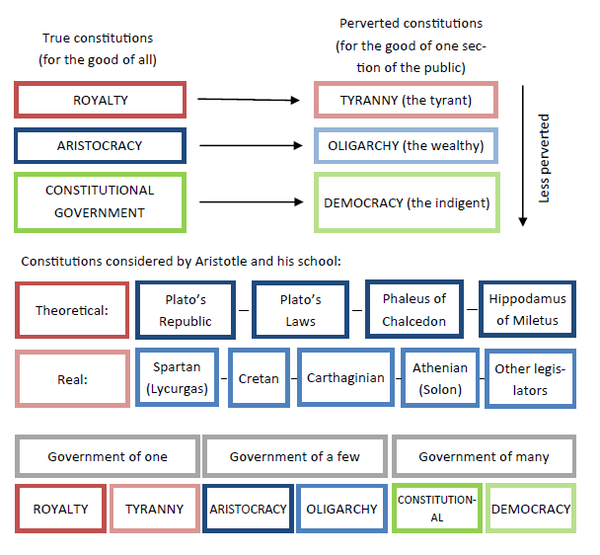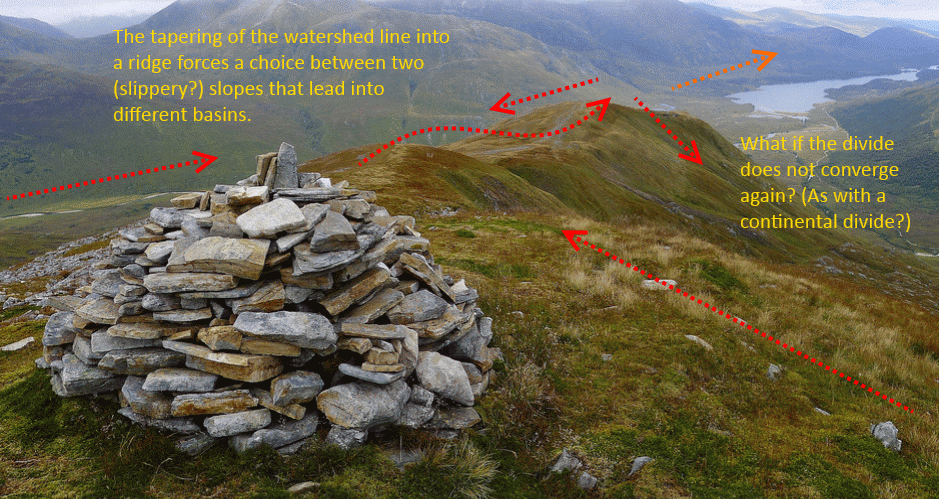A video lecture well worth pondering:
To clarify a point or two, let us observe a handy outline of Plato’s types of Government, where he — and IIRC he was once captured and enslaved, having to be ransomed — feared continual deterioration ending in enslavement under tyrants:
and Aristotle’s six types (HT, Elaiza Olegario slideshare):
elaborating (HT, Wikiwand):
It is well worth adding here, Plato’s Socrates as he responds to Plato’s brother Adeimantus, and outlines the parable of the ship of state:
>>I perceive, I said, that you are vastly amused at having plunged me into such a hopeless discussion; but now hear the parable, and then you will be still more amused at the meagreness of my imagination: for the manner in which the best men are treated in their own States is so grievous that no single thing on earth is comparable to it; and therefore, if I am to plead their cause, I must have recourse to fiction, and put together a figure made up of many things, like the fabulous unions of goats and stags which are found in pictures.
Imagine then a fleet or a ship in which there is a [captain-owner . . . the people] who is taller and stronger than any of the crew, but he is a little deaf and has a similar infirmity in sight, and his knowledge of navigation is not much better [–> the common people do not know the skills of sound governemnt]. The sailors [–> ambitious manipulative politicians] are quarrelling with one another about the steering –every one is of opinion that he has a right to steer [steersman, kubernete — root of our term government], though he has never learned the art of navigation and cannot tell who taught him or when he learned, and will further assert that it cannot be taught, and they are ready to cut in pieces any one who says the contrary. They throng about the captain, begging and praying him to commit the helm to them [–> politics of manipulation, note role of political rhetoric as opposed to sound counsel]; and if at any time they do not prevail, but others are preferred to them, they kill the others or throw them overboard [–> nihilism and ruthlessness], and having first chained up the noble captain’s senses with drink or some narcotic drug [–> befuddlement of the public to induce support for what cannot stand on its own merits], they mutiny and take possession of the ship and make free with the stores [–> improvidence, short-sightedness and likely corruption]; thus, eating and drinking, they proceed on their voyage in such a manner as might be expected of them [–> on the likely end of such a voyage cf, Luke’s subtle real world, Mid Oct 59 AD parallel in Acts 27]. Him who is their partisan and cleverly aids them in their plot for getting the ship out of the captain’s hands into their own [–> notice agenda of domination of the public] whether by force or persuasion, they compliment with the name of sailor, pilot, able seaman [–> mutual support and circles of mutual public esteem of the “peers” in the agenda], and abuse the other sort of man, whom they call a good-for-nothing [–> target the man as you cannot address the issue; beware the movement that is all angels and everyone who dares question or stand forth as an alternative can only be a devil]; but that the true pilot must pay attention to the year and seasons and sky and stars and winds, and whatever else belongs to his art, if he intends to be really qualified for the command of a ship, and that he must and will be the steerer [–> the issue of technical ability, disciplined, virtuous character and actual capability in governance shown by track record], whether other people like or not-the possibility of this union of authority with the steerer’s art has never seriously entered into their thoughts [–> not just ignorant, misinformed, manipulated and indoctrinated so that as Marfin has observed: “Evidence never looks compelling if you don`t engage with it”] or been made part of their calling.
Now in vessels which are in a state of mutiny and by sailors who are mutineers, how will the true pilot be regarded? Will he not be called by them a prater, a star-gazer, a good-for-nothing? [Jowett, Plato’s Republic Bk VI.] >>
Let us ponder Cuddeback’s concerns about divisiveness and disintegration of community triggered by want of unifying focus on a sound principal virtue. Multiply by the way modern government sought to stabilise democratic government to gain benefits of unleashing liberty without triggering a slide back into oligarchy or a runaway towards anarchy leading to a snap-back into tyranny.
For instance, observe Locke’s use of Hooker in Ch 2 of his 2nd treatise on Government, and Hooker’s onward use of both the golden rule and Aristotle’s Nicomachean Ethics:
>>. . . if I cannot but wish to receive good, even as much at every man’s hands, as any man can wish unto his own soul, how should I look to have any part of my desire herein satisfied, unless myself be careful to satisfy the like desire which is undoubtedly in other men . . . my desire, therefore, to be loved of my equals in Nature, as much as possible may be, imposeth upon me a natural duty of bearing to themward fully the like affection. From which relation of equality between ourselves and them that are as ourselves, what several rules and canons natural reason hath drawn for direction of life no man is ignorant . . . [[Hooker then continues, citing Aristotle in The Nicomachean Ethics, Bk 8:] as namely, That because we would take no harm, we must therefore do none; That since we would not be in any thing extremely dealt with, we must ourselves avoid all extremity in our dealings; That from all violence and wrong we are utterly to abstain, with such-like . . . ] [[Eccl. Polity,preface, Bk I, “ch.” 8, p.80, cf. here.]>>
Bringing to bear also, Blackstone in his commentaries on the Laws of England (from 1765):
>>Man, considered as a creature, must necessarily be subject to the laws of his creator, for he is entirely a dependent being . . . consequently, as man depends absolutely upon his maker for every thing, it is necessary that he should in all points conform to his maker’s will. This will of his maker is called the law of nature. For as God, when he created matter, and endued it with a principle of mobility, established certain rules for the perpetual direction of that motion; so, when he created man, and endued him with freewill to conduct himself in all parts of life, he laid down certain immutable laws of human nature, whereby that freewill is in some degree regulated and restrained, and gave him also the faculty of reason to discover the purport of those laws . . . These are the eternal, immutable laws of good and evil, to which the creator himself in all his dispensations conforms; and which he has enabled human reason to discover, so far as they are necessary for the conduct of human actions. Such among others are these principles: that we should live honestly [NB: cf. Exod. 20:15 – 16], should hurt nobody [NB: cf. Rom 13:8 – 10], and should render to every one his due [NB: cf. Rom 13:6 – 7 & Exod. 20:15]; to which three general precepts Justinian[1: a Juris praecepta sunt hace, honeste vivere. alterum non laedere, suum cuique tribuere. Inst, 1. 1. 3] has reduced the whole doctrine of law [and, Corpus Juris, Justinian’s Christianised precis and pruning of perhaps 1,000 years of Roman jurisprudence, in turn is the foundation of law for much of Europe]. [Parenthetical remarks and emphases added.]>>
and the US DoI, 1776 in paragraphs 1 and 2:
>>When . . . it becomes necessary for one people . . . to assume among the powers of the earth, the separate and equal station to which the Laws of Nature and of Nature’s God entitle them, a decent respect to the opinions of mankind requires that they should declare the causes which impel them to the separation.
We hold these truths to be self-evident, [cf Rom 1:18 – 21, 2:14 – 15], that all men are created equal, that they are endowed by their Creator with certain unalienable Rights, that among these are Life, Liberty and the pursuit of Happiness. –That to secure these rights, Governments are instituted among Men, deriving their just powers from the consent of the governed, –That whenever any Form of Government becomes destructive of these ends, it is the Right of the People to alter or to abolish it, and to institute new Government, laying its foundation on such principles and organizing its powers in such form, as to them shall seem most likely to effect their Safety and Happiness. Prudence, indeed, will dictate that Governments long established should not be changed for light and transient causes; and accordingly all experience hath shewn, that mankind are more disposed to suffer, while evils are sufferable, than to right themselves by abolishing the forms to which they are accustomed. But when a long train of abuses and usurpations, pursuing invariably the same Object evinces a design to reduce them under absolute Despotism, it is their right, it is their duty, to throw off such Government, and to provide new Guards for their future security . . . >>
In that context, further reflect on the following frame of dynamics:

Also, the context that until there was printing, with ever-widening literacy, the rise of newspapers etc, and the working out of the historically rooted classical dilemmas of government, including associated theological-ethical issues [cf here in context], modern liberty and self-government by a free people was not feasible. This puts the 1400’s – 1600’s as a transitional era, and it points to the 1700’s as when increasingly democratic stabilised government under modern circumstances became feasible. Then, this began a period of reforms (of course running in parallel with a far sadder history of radical revolutions).
However, the bottomline remains: democratic polities are inherently unstable and we trifle with the stabilising buttresses at peril.
That is the context for a remark I made to WJM at 67 in the sad news thread:
>>It seems to me that there is a dominant narrative that the civilisation formerly known as Christendom is what is primarily wrong with the world, and that it is that heritage that is the root of bitterness.
So, we see a red- double green de facto alliance (including the rainbow coalition under the reds) that has steadfastly worked to remove what they perceive as the root of bitterness. (This case, BTW, is one where we had green on rainbow attack . . . maybe a gun was jumped, maybe it is judged time to move in for the kill. But the red side is trying to spin it as the old familiar Christendom is the problem to be uprooted, narrative.)
However, those who see the world this way have failed to understand that democracy failed in the classical world, republicanism failed, leaving messianic dictatorial empire — or, have we forgotten why Octavian was hailed as a divine rescuer and called Augustus . . . written into our calendar?
Failed, due to inherent instabilities.
In that context, they did not realise that the Judaeo Christian tradition and linked natural law provided key stabilising buttresses for modern democracy. Now that these are being chopped and burned away in implacable rage, the inherent instability is going to tell again.
And with the intensity of polarisation at work, I have very little confidence that we can return to sanity before things crash and burn very badly.
I hear you that some are buying guns to try to defend themselves, but that is hardly likely to be for when they go to nightclub or the like.
As for, oh they go to conservatives, the problem is “conservative” and even in many cases “church” does not mean what it once would have.
I fear, factions are arming for civil war and defending themselves in the face of chaos. With the “zombie” meme a thinly veiled reference to rampaging mobs.
Instead, I have suggested modifying the Swiss model and developing a pervasive civilian but disciplined marshal corps that would harden soft targets and release police for taking back the enclaves. (And beyond, the Marines — likely, joint — would take out the sources where amphibious expeditions become necessary. The Barbary coast wars are full of lessons on that.)
I suggest it, not because I think it is likely, but as a witness that there was a reasonable, feasible alternative refused.
I am pessimistic about our civilisation.
We have played the fool and have wandered out far along a dividing watershed, so that we are now being wedged apart faster and faster down mutually opposed slippery slopes.
Absent miraculous rescue (and if you have been led to imagine Mr Trump is a political messiah . . . ), this will not end well.>>
Where, the global geostrategic issue can be pictured, as a sketch:
Do we really understand the matches we are playing with? END




